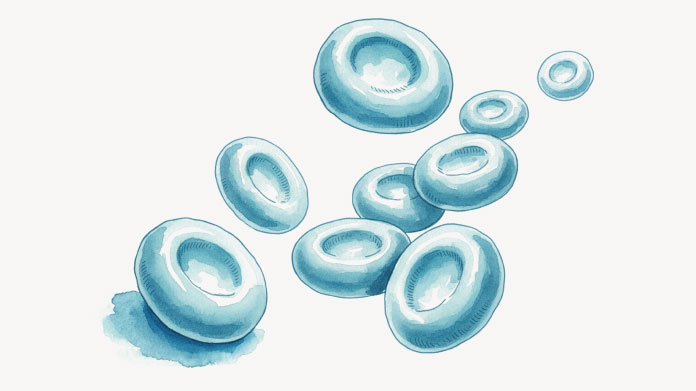Mitochondria: which supplement should you take to support them?
Mitochondria (the cells’ power plants) deteriorate with age but you can help take care of yours and slow down the ageing process with our tips and natural remedies.

Mitochondria provide ATP to cells
Mitochondria are organelles within cells, often referred to as ‘powerhouses’ (1).
They are the site at which cellular respiration takes place, the process whereby glucose is converted into ATP (Adenosine Tri-Phosphate). ATP is a molecule essential for cellular energy metabolism: it provides the energy cells need in order to function.
Is mitochondrial dysfunction at the heart of ageing?
Mitochondrial function relies on a delicate balance involving calcium transporters and the voltage-dependent anion channel.
As our cells age, mitochondrial dysfunction increases, leading to the accumulation of calcium in the cell matrix. This causes the mitochondria to release pro-apoptotic factors (apoptosis being programmed cell death) as well as free radicals which eventually reduces the mitochondria’s potential.
Indeed, over recent decades, scientists have been closely studying the effects of mitochondrial dysfunction on ageing. They largely concur that, like telomeres, mitochondria constitute key elements in the fight against the effects of ageing and thus require care and attention (2-4).
Diet and exercise to support mitochondria
As we’ve seen, the main threat to mitochondria comes from free radicals. A diet high in trans fatty acids (the fats found in ultra-processed foods), free sugars, salt, alcohol, processed and red meat, etc. encourages free radical production and puts a severe strain on our mitochondria (5).
First of all then, it’s essential to eat a healthy, balanced diet containing plenty of fresh fruits and vegetables, vitamins and ‘good’ fats.
It’s equally important to take regular exercise, as long as it’s moderate: strenuous exercise has been shown to promote free radical production whereas moderate activity stimulates antioxidants and the immune system.
The human body is actually a complex ecosystem: any kind of excess upsets the balance and causes the ageing process to speed up. So to prevent mitochondrial dysfunction and an acceleration in ageing, it’s vital to adopt a healthy, balanced and natural lifestyle.
Spotlight on some natural substances essential for the mitochondria
Pyrroloquinoline quinone
Also called methoxatin, pyrroloquinoline quinone (PQQ) is the cofactor of several redox enzymes. Combined with coenzyme Q10 in the mitochondria, PQQ/methoxatin also supports production of ATP.
A number of studies have also shown a correlation between a lack of PQQ and certain physiological abnormalities.
Most significantly, however, an American study found pyrroloquinoline quinone to have 30,000-50,000 times more antioxidant efficacy than vitamin C, and to be capable of neutralising thousands of free radicals before being reduced - the same free radicals that cause mitochondrial dysfunction (6-7).
Alpha-lipoic acid
A natural antioxidant, alpha-lipoic acid is present in the mitochondria where it acts as a co-enzyme of pyruvate dehydrogenase and α-ketoglutarate dehydrogenase, two enzymes that function as catalysts of carbohydrate and amino acid metabolism.
Alpha-lipoic acid thus plays a key role in mitochondrial function and APT production (8-9).
Acetyl-L-carnitine
L-carnitine is produced in the liver, brain and kidneys from the amino acids lysine and methionine. Its role in the body is to help transport fatty acids to the mitochondria where they will be metabolised to ultimately provide ATP. Some studies suggest it leads to increased oxygen consumption in the mitochondria.
Given that concentrations of these substances in the body decline with age, researchers at the University of California, Berkeley, conducted an experiment in which they combined acetyl-L-carnitine, to stimulate activity of an enzyme that plays an important role in mitochondria, with alpha-lipoic acid, in particular for its antioxidant action. Their results showed an increase in memory and energy levels in the subjects examined (10).
Supplements and synergistic formulations for supporting the mitochondria
Alongside a healthy, balanced diet; regular, moderate exercise; sufficient good quality sleep; and cutting down or giving up alcohol, smoking and added sugars, some people also choose to take supplements targeted at the mitochondria, with the aim of delaying the effects of ageing.
In this respect, it may help to take supplements containing pyrroloquinoline quinone (PQQ), alpha-lipoic acid and acetyl-L-carnitine, all of which play a role in how mitochondria function.
You could also opt for a synergistic formulation in which all three of these molecules are combined to maximise their benefits (such as Mitochondrial Formula).
References
- https://planet-vie.ens.fr/thematiques/cellules-et-molecules/organisations-cellulaires/les-mitochondries
- CUI, Hang, KONG, Yahui, et ZHANG, Hong. Oxidative stress, mitochondrial dysfunction, and aging. Journal of signal transduction, 2012, vol. 2012.
- CHISTIAKOV, Dimitry A., SOBENIN, Igor A., REVIN, Victor V., et al. Mitochondrial aging and age-related dysfunction of mitochondria. BioMed research international, 2014, vol. 2014.
- KONG, Yahui, TRABUCCO, Sally E., et ZHANG, Hong. Oxidative stress, mitochondrial dysfunction and the mitochondria theory of aging. Aging, 2014, vol. 39, p. 86-107.
- BONNARD, Charlotte, DURAND, Annie, PEYROL, Simone, et al.Mitochondrial dysfunction results from oxidative stress in the skeletal muscle of diet-induced insulin-resistant mice. The Journal of clinical investigation, 2008, vol. 118, no 2, p. 789-800.
- RUCKER, Robert, STITES, Tracy, STEINBERG, Francene, et al.Physiological importance of pyrroloquinoline quinone. Biochemistry and Molecular Biology of Vitamin B6 and Pqq-Dependent Proteins, 2000, p. 61-66.
- HE, Kai, NUKADA, Hitoshi, URAKAMI, Teiji, et al.Antioxidant and pro-oxidant properties of pyrroloquinoline quinone (PQQ): implications for its function in biological systems. Biochemical pharmacology, 2003, vol. 65, no 1, p. 67-74.
- PACKER, Lester, WITT, Eric H., et TRITSCHLER, Hans Jürgen. Alpha-lipoic acid as a biological antioxidant. Free radical biology and medicine, 1995, vol. 19, no 2, p. 227-250.
- CHENG, Li-Ching, SU, Kuo-Hui, KOU, Yu Ru, et al.α-Lipoic acid ameliorates foam cell formation via liver X receptor α-dependent upregulation of ATP-binding cassette transporters A1 and G1. Free Radical Biology and Medicine, 2011, vol. 50, no 1, p. 47-54.
- REBOUCHE, Charles J. Kinetics, pharmacokinetics, and regulation of l‐carnitine and acetyl‐l‐carnitine metabolism. Annals of the New York Academy of Sciences, 2004, vol. 1033, no 1, p. 30-41.
12 Hours
Great service and lots of information
Great service and lots of information
Gabi
3 Days
Service Satisfaction
I’m satisfied with the service; it fulfilled what it set out to do.
Anfhony Abreu
6 Days
Original product and fast delivery
Original product and fast delivery. I haven't started it yet, but will do soon.
Vincenza Catania
9 Days
Good quality
Good quality. Good service.
Leonel Guzman
11 Days
Top!!!!!!!!
Top!!!!!!!!
Michael
13 Days
Excellent!
Products are great and delivered fast!
PARDINI Debora
13 Days
From order to receive the product
From order to receive the product, the process is smooth & fast. It’s good to customers.
WONG Mei Ling
14 Days
Fast delivery
very quick delivery to italy. product is good.
Customer
16 Days
Prompt delivry !!👍
Prompt delivry !!👍
SWEET Christine
16 Days
Good delivery and flawless quality
AS far as delivery and the visual quality are concerned, Supersmart is excellent. I will not comment on the efficacy of the products themselves, since that is only possible over a longer period and in a large customer base compared to people who do not consume a particular product.
Roger De Backer
17 Days
Perfect services
Perfect services, perfect support, great articles about products
Michaela Alali Beitlová
18 Days
Great experience and effective supplements
I’ve purchased many types of supplements from this company over the course of years to treat a few issues, and I’m satisfied with their quality. After using them consistently for a period of time, I can say they met my expectations and I could feel real health benefits that built up over time. Deliveries are always quick. I recommend this company to anyone looking for high-quality supplements.
Giordano
18 Days
Es hat alles gestimmt
Es hat alles gestimmt. Top
marina thieme
21 Days
Great product
Great product, but still evaluating its effectiveness. Highly recommended. Super efficient delivery.
Chalise
25 Days
Quality products
Quality products , efficient and effective customer service. You can’t ask more
CLaudia
of experience
your money back
##montant## purchase



